A&S Faculty News
June 2017
Presley on Prairie Dogs and the Plague
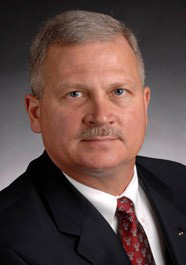 Steven Presley, Professor of Immunotoxicology and Countermeasures to Biological and
Chemical Threats in the Department of Environmental Toxicology, was interviewed in
a June 28 KCBD-TV news segment about prairie dogs and the plague. The news segment reported that the New Mexico
Department of Health confirmed three cases of the plague in Santa Fe County in June.
Presley told the station that black-tailed prairie dogs are the primary reservoir
for the plague in the Lubbock region. "Plague does occur in this area, it's just that
human cases don't typically occur," Presley said during the interview. The report
explained that, "When the plague occurs in a prairie dog colony, it kills 90-95 percent
of the prairie dogs, and when that happens, that's when other rodents, pets, or even
humans could be exposed." Presley expanded on that: "Fleas that are on those dead
prairie dogs, they need a blood meal. So, they are going to come up to the surface
and look for the next mammal to come by." He went on to say that infected fleas may
enter the area on the back of a coyote or through a prairie dog colony, but that's
no reason for overdue concern, though it's best to keep dogs and cats away from prairie
dog colonies. "It's not like you're going to walk into a (an active) prairie dog colony
and the fleas are all going to come running to you," Presley said, adding that active
colonies raise no threats; but when spider webs appear over the burrows, that's evidence
that colony has started dying off and a sign to stay away.
Steven Presley, Professor of Immunotoxicology and Countermeasures to Biological and
Chemical Threats in the Department of Environmental Toxicology, was interviewed in
a June 28 KCBD-TV news segment about prairie dogs and the plague. The news segment reported that the New Mexico
Department of Health confirmed three cases of the plague in Santa Fe County in June.
Presley told the station that black-tailed prairie dogs are the primary reservoir
for the plague in the Lubbock region. "Plague does occur in this area, it's just that
human cases don't typically occur," Presley said during the interview. The report
explained that, "When the plague occurs in a prairie dog colony, it kills 90-95 percent
of the prairie dogs, and when that happens, that's when other rodents, pets, or even
humans could be exposed." Presley expanded on that: "Fleas that are on those dead
prairie dogs, they need a blood meal. So, they are going to come up to the surface
and look for the next mammal to come by." He went on to say that infected fleas may
enter the area on the back of a coyote or through a prairie dog colony, but that's
no reason for overdue concern, though it's best to keep dogs and cats away from prairie
dog colonies. "It's not like you're going to walk into a (an active) prairie dog colony
and the fleas are all going to come running to you," Presley said, adding that active
colonies raise no threats; but when spider webs appear over the burrows, that's evidence
that colony has started dying off and a sign to stay away.
Guengerich Gets Brown Fellowship
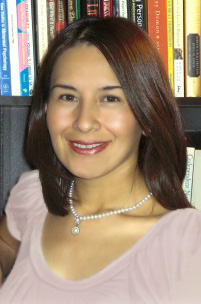 Sara Guengerich, Associate Professor of Spanish and Associate Professor and Graduate
Advisor for Spanish in the Department of Classical & Modern Languages & Literatures,
has been awarded a Long-Term Fellowship at the John Carter Brown Library (JCBL) in
Providence, R.I. Sponsorship of research at the JCBL is highly competitive (only 12
percent of the applicants are selected) and reserved exclusively for scholars whose
work is centered on the colonial history of the Americas, North and South, including
all aspects of the European, African, and Native American engagement. This in-residence
fellowship will afford Guengerich the opportunity to work on her book, "Daughters
of the Inca Conquest: Indigenous Noblewomen in Colonial Peru," during the fall 2017
semester. The $21,000 fellowship from Brown University was announced the week ending
June 2.
Sara Guengerich, Associate Professor of Spanish and Associate Professor and Graduate
Advisor for Spanish in the Department of Classical & Modern Languages & Literatures,
has been awarded a Long-Term Fellowship at the John Carter Brown Library (JCBL) in
Providence, R.I. Sponsorship of research at the JCBL is highly competitive (only 12
percent of the applicants are selected) and reserved exclusively for scholars whose
work is centered on the colonial history of the Americas, North and South, including
all aspects of the European, African, and Native American engagement. This in-residence
fellowship will afford Guengerich the opportunity to work on her book, "Daughters
of the Inca Conquest: Indigenous Noblewomen in Colonial Peru," during the fall 2017
semester. The $21,000 fellowship from Brown University was announced the week ending
June 2.
Dhurandhar Talks Healthy Cereal
Emily Dhurandhar, Assistant Professor of Kinesiology in the Department of Kinesiology & Sport Management, was quoted in a June 24 Yahoo! Finance story, also published in the July Consumer Reports in Health, on "How to Pick a Healthy Cereal." Dhurandhar noted in the story that whole grains are a great source of fiber and help people feel full. Those who get plenty of fiber at breakfast are "not going to be having a hunger attack mid-morning," she was quoted as saying.
Hase Collaborated on Breakthrough
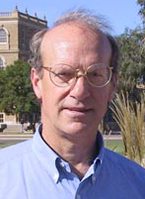 Bill Hase, a Paul Whitfield Horn Professor and the Robert A. Welch Chair in the Department
of Chemistry & Biochemistry, collaborated on a study that might answer an old question
in organic chemistry. In a paper published in the journal Nature Communications, Hase,
researchers at the University of Innsbruck in Austria, and computational and theoretical
chemists at Harbin University in China showed their study of the competition between
two important reactions of organic chemistry: the E2 elimination reaction and the
SN2 substitution reaction. "We established, at the atomistic level, the manner in
which these reaction mechanisms occur," Hase said in an in-depth story in Texas Tech
Today published June 23. "It is important to understand how reactions occur at the
atomistic level because these mechanisms are important in biological reactions and
organic synthesis." Hase said it took about three years to complete the study. "I
am happy with our results; it is the first complete atomistic study for competing
E2 and SN2 mechanisms," Hase was quoted as saying.
Bill Hase, a Paul Whitfield Horn Professor and the Robert A. Welch Chair in the Department
of Chemistry & Biochemistry, collaborated on a study that might answer an old question
in organic chemistry. In a paper published in the journal Nature Communications, Hase,
researchers at the University of Innsbruck in Austria, and computational and theoretical
chemists at Harbin University in China showed their study of the competition between
two important reactions of organic chemistry: the E2 elimination reaction and the
SN2 substitution reaction. "We established, at the atomistic level, the manner in
which these reaction mechanisms occur," Hase said in an in-depth story in Texas Tech
Today published June 23. "It is important to understand how reactions occur at the
atomistic level because these mechanisms are important in biological reactions and
organic synthesis." Hase said it took about three years to complete the study. "I
am happy with our results; it is the first complete atomistic study for competing
E2 and SN2 mechanisms," Hase was quoted as saying.
Hayhoe Reaches Out to Skeptics
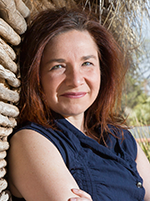 Katharine Hayhoe, Associate Professor in the Department of Political Science and Director
of TTU's Climate Science Center, was interviewed by New Statesman in a June 21 article
about how she works to convince skeptics that man-made climate change is a threat to Earth's future. "When I talk to people
who are doubtful, I try to connect with the values they already have," the article
quoted Hayhoe as saying. "The greatest myth is the myth of complacency—that 'it doesn't
really matter to me.' But I would say that the second most insidious myth is that
you only care about this issue if you're a certain type of person. If you're a green
person, or a liberal person, or a granola person." Such stereotypes may cause climate
skeptics to say, "I can't be that kind of person because that's not who I am," she
explained. The article went on to describe that whether Hayhoe is speaking to city
planners, water company managers, school kids or Bible believers, she reaches out
to people on subjects they already feel strongly about. "I recently talked to arborists,"
she told New Statesman. "For them, trees and plants are important, so I connect with
them on that, and say 'because we care about trees, or because we care about water
or what the Bible says then let me share with you from the heart why I care about
these issues because it affects something that you already care about.' My angle is
to show people that they don't need to be a different person at all; exactly who they
already are is the kind of person who can care about climate change."
Katharine Hayhoe, Associate Professor in the Department of Political Science and Director
of TTU's Climate Science Center, was interviewed by New Statesman in a June 21 article
about how she works to convince skeptics that man-made climate change is a threat to Earth's future. "When I talk to people
who are doubtful, I try to connect with the values they already have," the article
quoted Hayhoe as saying. "The greatest myth is the myth of complacency—that 'it doesn't
really matter to me.' But I would say that the second most insidious myth is that
you only care about this issue if you're a certain type of person. If you're a green
person, or a liberal person, or a granola person." Such stereotypes may cause climate
skeptics to say, "I can't be that kind of person because that's not who I am," she
explained. The article went on to describe that whether Hayhoe is speaking to city
planners, water company managers, school kids or Bible believers, she reaches out
to people on subjects they already feel strongly about. "I recently talked to arborists,"
she told New Statesman. "For them, trees and plants are important, so I connect with
them on that, and say 'because we care about trees, or because we care about water
or what the Bible says then let me share with you from the heart why I care about
these issues because it affects something that you already care about.' My angle is
to show people that they don't need to be a different person at all; exactly who they
already are is the kind of person who can care about climate change."
Sagarzazu on Venezuelan VP
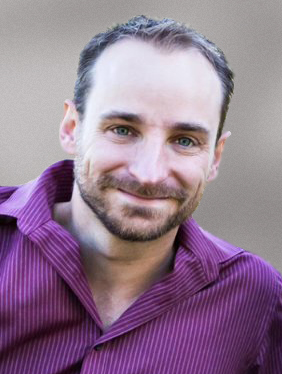 Inaki Sagarzazu, Assistant Professor in the Department of Political Science, was quoted
in a June 21 article about Venezuelan Vice President Tareck El Aissami. Published by TRT Today, the article headlined, "How the U.S. Right Demonized a Venezuelan
Leader," detailed how the United States Department of Treasury imposed financial sanctions on Aissami, of Syrian-Lebanese descent, for allegedly abetting drug trafficking and for allegedly
being a drug lord himself. Sagarzazu was quoted in the article as saying, "I don't
have specific information about Aissami, but when relatives of senior leaders have
been found to be involved, then I guess anything can happen." The article explained
that Sagarzazu was referring to Efrain Antonio Campo Flores and Franqui Francisco
Flores de Freitas, nephews-in-law of Venezuelan President Nicolas Maduro, who were
arrested by the U.S. on charges of drug trafficking.
Inaki Sagarzazu, Assistant Professor in the Department of Political Science, was quoted
in a June 21 article about Venezuelan Vice President Tareck El Aissami. Published by TRT Today, the article headlined, "How the U.S. Right Demonized a Venezuelan
Leader," detailed how the United States Department of Treasury imposed financial sanctions on Aissami, of Syrian-Lebanese descent, for allegedly abetting drug trafficking and for allegedly
being a drug lord himself. Sagarzazu was quoted in the article as saying, "I don't
have specific information about Aissami, but when relatives of senior leaders have
been found to be involved, then I guess anything can happen." The article explained
that Sagarzazu was referring to Efrain Antonio Campo Flores and Franqui Francisco
Flores de Freitas, nephews-in-law of Venezuelan President Nicolas Maduro, who were
arrested by the U.S. on charges of drug trafficking.
Hayhoe Tweets About Hawking
Katharine Hayhoe, Associate Professor in the Department of Political Science and Director of TTU's Climate Science Center, was one of the speakers at Starmus, a science and art festival headlined by famed physicist and cosmologist Stephen Hawking. Hayhoe tweeted about Hawking's June 20 talk, and her tweets became part of a June 21 Vox.com article about Hawking's recommendation that the people of Earth look for other planets to inhabit.
Stoll at Home of Frederic Church
Mark Stoll, Professor in the Department of History, gave a lecture in Greenport, N.Y., June 17 at the Wagon House Education Center at Olana State Historic Site, home to 19th century American landscape artist Frederic Church. Stoll is author of "Inherit the Holy Mountain: Religion and the Rise of American Environmentalism" (Oxford University Press 2015). Stoll discussed how certain Christian denominations in the United States shaped the views of the early environmentalists, with a focus on how these ideas influenced Church's work.
Hayhoe Interviewed on Podcast
Katharine Hayhoe, Associate Professor in the Department of Political Science and Director of TTU's Climate Science Center, was interviewed in an AmericaAdapts podcast promoted June 16 by Daily Koz. Headlined, "Can Evangelical Christians adapt to Climate Change?," the news brief published select quotes from the podcast, such as, "Faith is evidence of what we don't see; science is evidence of what we do see." In episode 44 of America Adapts (subscription required), reports the Daily Koz, Doug Parsons talks with Hayhoe about the role of religion in one's attitude toward climate change, and about Hayhoe's recent activities to educate the public.
McKee: Texas Won't Soon Turn Blue
Seth McKee, Associate Professor in the Department of Political Science, was interviewed by FOX-34 television in a June 10 news story about Democrats who hope to make Texas a blue state. McKee told the TV station that although changing demographics appear to be in the Democrats' favor, he does not expect Texas to flip very soon, even though he thinks Trump is a drag on the Republicans. "I mean he wasn't a strong Republican candidate at the top of a ticket. A John Cornyn does better," McKee said on the broadcast. "So if you look at a Republican Texans can rally around, they're more likely to support them than Trump."
Moore in Report on Infrastructure
Kristen Moore, Assistant Professor in the Department of English, was mentioned June 7 in a National Resources Defense Council report about infrastructure improvement. One aspect of the report addressed the steps toward infrastructure projects that can cause delays, such as environmental reviews. In that regard, and according to the report, Moore found a paper that examined the work of a communications firm in the Midwest; that company reached more than 1,000 people through various activities so that they could review and respond to a large rail project. The report held that projects under environmental review were improved with public involvement.
Presley Predicts Isolated Zika Hits
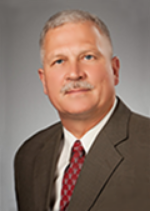 Steve Presley, Professor in The Institute of Environmental and Human Health (TIEHH)
and Director of the Biological Threat Research Lab, says there almost certainly will
be an outbreak of Zika virus this year. "I don't know if it will be in Texas; there
probably will be isolated areas where there are outbreaks," he said in a June 5 Texas
Tech Today article. "I wouldn't even hazard to try to predict how many we'll see or
how bad it'll be. The potential is there, though. We know that." With that in mind,
Presley is preparing to launch an important statewide research project funded by a
$200,000 public health grant from the Texas Department of State Health Services (DSHS). The goal is to study the effectiveness of insecticides used throughout the
state against the two mosquito species that transmit Zika virus and other diseases.
On June 6, MyHighPlains.com picked up the story, with the headline: "'Can We Kill Them?' TIEHH Researcher Studying
Zika-Transmitting Mosquitoes." That was followed June 8 by a KCBD-TV news segment, "TTU Researchers Beginning Zika Study That Could Help the Entire State." And on
June 19, the Lubbock Avalanche-Journal interviewed Presley for the article, "Texas Tech Researcher Receives Grant to Test
Mosquito Pesticides in Texas Counties."
Steve Presley, Professor in The Institute of Environmental and Human Health (TIEHH)
and Director of the Biological Threat Research Lab, says there almost certainly will
be an outbreak of Zika virus this year. "I don't know if it will be in Texas; there
probably will be isolated areas where there are outbreaks," he said in a June 5 Texas
Tech Today article. "I wouldn't even hazard to try to predict how many we'll see or
how bad it'll be. The potential is there, though. We know that." With that in mind,
Presley is preparing to launch an important statewide research project funded by a
$200,000 public health grant from the Texas Department of State Health Services (DSHS). The goal is to study the effectiveness of insecticides used throughout the
state against the two mosquito species that transmit Zika virus and other diseases.
On June 6, MyHighPlains.com picked up the story, with the headline: "'Can We Kill Them?' TIEHH Researcher Studying
Zika-Transmitting Mosquitoes." That was followed June 8 by a KCBD-TV news segment, "TTU Researchers Beginning Zika Study That Could Help the Entire State." And on
June 19, the Lubbock Avalanche-Journal interviewed Presley for the article, "Texas Tech Researcher Receives Grant to Test
Mosquito Pesticides in Texas Counties."
Milam Interviewed about D-Day
Ron Milam, Associate Professor of Military History in the Department of History, and Interim director of TTU's newly established Institute for Peace and Conflict, was quoted in a Jun 5 Lubbock Avalanche-Journal article about D-Day. "I think the amazing thing about the landing force is that most of them were totally untrained in combat," Milam told the AJ. "The guys that have been there, the ones that I have talked to, the veterans of it, they can hardly even describe it."
Hayhoe: Politics and Climate Views
 Katharine Hayhoe, Associate Professor in the Department of Political Science and Director
of TTU's Climate Science Center, was quoted in a June 2 Washington Post story, written
on the heels of President Trump's announced withdrawal from the Paris climate agreement,
about the divide among Christians who do and do not accept climate change. "Climate
change has been painted as an alternate religion," with phrases like, "Do you believe
in global warming?" she was quoted as saying in the story. But, the article went on
to say, Hayhoe finds that it is political affiliations, more than religious convictions,
that drive evangelicals' attitudes on climate change. "Somehow evangelicalism got politicized to the point where, [for] many people who
call themselves evangelicals, their theological statement is written by their political
party first," she told the newspaper, which backed her statement with a 2015 analysis
from the Pew Research Center that found political party identification, race, and
ethnicity are stronger predictors of views about climate change beliefs than religious
identity or observance.
Katharine Hayhoe, Associate Professor in the Department of Political Science and Director
of TTU's Climate Science Center, was quoted in a June 2 Washington Post story, written
on the heels of President Trump's announced withdrawal from the Paris climate agreement,
about the divide among Christians who do and do not accept climate change. "Climate
change has been painted as an alternate religion," with phrases like, "Do you believe
in global warming?" she was quoted as saying in the story. But, the article went on
to say, Hayhoe finds that it is political affiliations, more than religious convictions,
that drive evangelicals' attitudes on climate change. "Somehow evangelicalism got politicized to the point where, [for] many people who
call themselves evangelicals, their theological statement is written by their political
party first," she told the newspaper, which backed her statement with a 2015 analysis
from the Pew Research Center that found political party identification, race, and
ethnicity are stronger predictors of views about climate change beliefs than religious
identity or observance.
Williams Gets Grant for TexPREP
Brock Williams, Professor in the Department of Mathematics & Statistics, received a total of $9,449 from The University of Texas at San Antonio for "TexPREP-Lubbock 2017." The TexPREP-Lubbock is a pre-freshman summer enrichment program for students in grades 6-12. The curriculum in math, science and engineering is designed to prepare students to major in those subjects once they enter college. The award was announced the week ending June 2.
Presley Lands 2 Grants from DHHS
Steven Presley, Professor in the Department of Environmental Toxicology/The Institute of Environmental & Human Health, received a $200,000 grant from the Texas Department of State Health Services (DSHS) for research on "Insecticide Resistance Testing of Texas Aedes aegypti and Aedes albopictus Populations." Aedes aegypti and Aedes albopictus are the two varieties of mosquitoes that can carry Zika virus and other diseases harmful to humans. Presley also received a separate $72,000 from the Texas DSHS to pursue research on "Enhanced KIKV Diagnostic Throughput Capacity." Both awards were announced the week ending June 2.
Owen & Corsi Confirm 3rd Wave
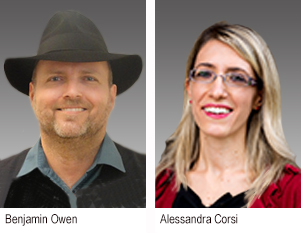 Benjamin Owen, Professor, and Alessandra Corsi, Assistant Professor, both Astrophysicists
in the Department of Physics & Astronomy, are on the research team that has confirmed
the third detection of gravitational waves and a new population of black holes. Just
as in the first two detections, the Laser Interferometer Gravitational-wave Observatory (LIGO) found gravitational waves, ripples in space and time, that were generated
when two black holes collided to form a larger black hole. The newly discovered black
hole has a mass about 49 times that of our Sun. These are collisions that produce
more power than is radiated as light by all the stars and galaxies in the universe
at any given time, according to a June 1 story in Texas Tech Today.
Benjamin Owen, Professor, and Alessandra Corsi, Assistant Professor, both Astrophysicists
in the Department of Physics & Astronomy, are on the research team that has confirmed
the third detection of gravitational waves and a new population of black holes. Just
as in the first two detections, the Laser Interferometer Gravitational-wave Observatory (LIGO) found gravitational waves, ripples in space and time, that were generated
when two black holes collided to form a larger black hole. The newly discovered black
hole has a mass about 49 times that of our Sun. These are collisions that produce
more power than is radiated as light by all the stars and galaxies in the universe
at any given time, according to a June 1 story in Texas Tech Today.
Corsi on High-Energy Transients
Alessandra Corsi, Assistant Professor of Astronomy in the Department of Physics & Astronomy, in collaboration with research teams from the international Global Relay of Observatories Watching Transients Happen (GROWTH), helped reveal two unrelated high-energy phenomena that followed the third detection of a gravitational wave event, dubbed GW170104, that occurred on Jan. 4. For months, GROWTH astronomers sifted through their data hoping to find the first electromagnetic counterpart of a gravitational-wave event and, in the process, they stumbled upon two unrelated, but nonetheless curious, high-energy transients: a gamma-ray burst and a relativistic supernova, according to a June 1 Texas Tech Today story.
Hayhoe on U.S. Pull-Out from Paris
Katharine Hayhoe, Associate Professor in the Department of Political Science and Director of TTU's Climate Science Center, was quoted in a June 1 article in the Lubbock Avalanche-Journal about President Trump's withdrawal from the Paris Agreement. "By excluding itself, what many U.S. companies are worried about is the fact that they won't have a seat at the table anymore," Hayhoe was quoted as saying. "By opting out of this agreement, the United States is opting out of its chance to help shape the agreement in the direction it would prefer."
Guengerich Studies Earthquakes
Sara Guengerich, Associate Professor of Spanish and Associate Professor and Graduate Advisor for Spanish in the Department of Classical & Modern Languages & Literatures, has been awarded a TTU Catalyst research award to study the effects of natural disasters in the textual production of colonial Peru. Her project, "Moving Histories: The Earthquakes in Colonial Peru and their importance for Interdisciplinary Research" will take her back to the colonial archives of Lima and Cuzco during summer 2017. This research promises to spark future interdisciplinary dialogues between the Humanities and the Sciences.
College of Arts & Sciences
-
Address
Texas Tech University, Box 41034, Lubbock, TX 79409-1034 -
Phone
806.742.3831 -
Email
arts-and-sciences@ttu.edu
